

An Illustrated Book of Bad Arguments. Developing critical thinking. It means not taking what you hear or read at face value, but using your critical faculties to weigh up the evidence, and considering the implications and conclusions of what the writer is saying.

Imagine two situations. On the first, you are on a country walk and you come across a notice which tells you not to attempt to climb a fence because of risk of electrocution. Would you pause to consider before obeying this instruction? On the other hand, suppose you were to receive a letter from a local farmer announcing that he proposed to put up an electric fence to protect a certain field. In this case, would you not be more likely to think about his reasons for doing so and what the implications would be for you and your family? Classical Writing Progymnasmata.
The Progymnasmata The ancient Progymnasmata are the basis for the Classical Writing curriculum.
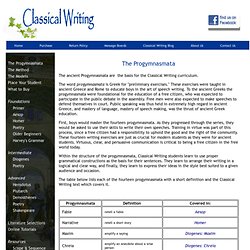
The word progymnasmata is Greek for "preliminary exercises. " These exercises were taught in ancient Greece and Rome to educate boys in the art of speech writing. List of thought processes. Nature of thought[edit] Thought (or thinking) can be described as all of the following: An activity taking place in a: brain – organ that serves as the center of the nervous system in all vertebrate and most invertebrate animals (only a few invertebrates such as sponges, jellyfish, adult sea squirts and starfish do not have a brain).
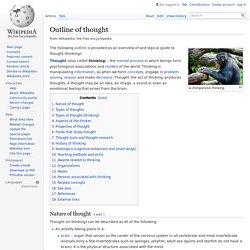
It is the physical structure associated with the mind. mind – abstract entity with the cognitive faculties of consciousness, perception, thinking, judgement, and memory. Having a mind is a characteristic of humans, but which also may apply to other life forms.[1][2] Activities taking place in a mind are called mental processes or cognitive functions.computer (see automated reasoning, below) – general purpose device that can be programmed to carry out a set of arithmetic or logical operations automatically. Types of thoughts[edit] Content of thoughts[edit] Types of thought (thinking)[edit] Listed below are types of thought, also known as thinking processes.
Lists. HOW DOES OUR LANGUAGE SHAPE THE WAY WE THINK? Humans communicate with one another using a dazzling array of languages, each differing from the next in innumerable ways.

Do the languages we speak shape the way we see the world, the way we think, and the way we live our lives? Do people who speak different languages think differently simply because they speak different languages? Thought-terminating cliché. Thought Reform and the Psychology of Totalism: A Study of "Brainwashing" in China is a non-fiction book by psychiatrist Robert Jay Lifton on the psychology of brainwashing and mind control.
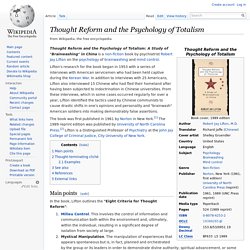
Lifton's research for the book began in 1953 with a series of interviews with American servicemen who had been held captive during the Korean War. In addition to interviews with 25 Americans, Lifton also interviewed 15 Chinese who had fled their homeland after having been subjected to indoctrination in Chinese universities. From these interviews, which in some cases occurred regularly for over a year, Lifton identified the tactics used by Chinese communists to cause drastic shifts in one's opinions and personality and "brainwash" American soldiers into making demonstrably false assertions. Main points[edit] In the book, Lifton outlines the "Eight Criteria for Thought Reform": Milieu Control. Thought-terminating cliché[edit] Lifton said:[4][5] Examples[edit] General examples. Claude Lévi-Strauss on pseudo-theory. Classic articles on statistical thinking. One of the fundamental cognitive tasks in analytical thinking is to reason about causality.
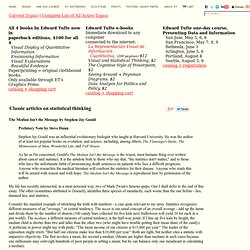
Thus one of the fundamental principles of analytical design is to show causality. Austin Bradford Hill's classic essay on thinking about causal evidence is reproduced here. Austin Bradford Hill, “The Environment and Disease: Association or Causation? Your Baloney Detection Kit Sucks. I still remember the thrill of first encountering a summary of Carl Sagan's Baloney Detection Kit .
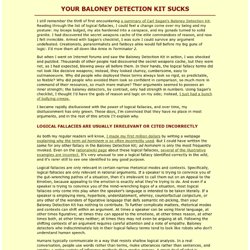
Reading through the list of logical fallacies, I could feel a change come over my being and my posture: my biceps bulged, my abs hardened into a carapace, and my gonads turned to solid granite. I had discovered the secret weapons cache of the elite commandoes of reason, and now I felt invincible. Armed with Sagan's checklist, I was sure I could survive any argument undefeated. Creationists, paranormalists and fanboys alike would fall before my big guns of logic: I'd mow them all down like Arnie in Terminator 2. But when I went on Internet forums and saw the Baloney Detection Kit in action, I was shocked and puzzled.
Teaching the Economic Way of Thinking Through Op-Eds by Joshua C. Hall, Marta Podemska-Mikluch. Joshua C.
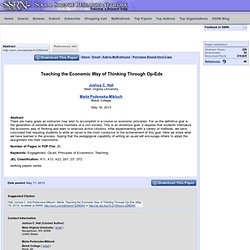
Hall West Virginia University Marta Podemska-Mikluch Beloit CollegeMay 16, 2013. Detective Game by Peter Pappas. I did not waste the opening week of school introducing the course – my students solved mysteries.

I took simplified mysteries and split them into 25-30 clues, each on a single strip of paper. Read my blog post on how I used this lesson. The Science of Forensics. Classroom Activity. Objective To recall what occurs when two people briefly disrupt class with an unanticipated interruption. copy of "Do You Remember?
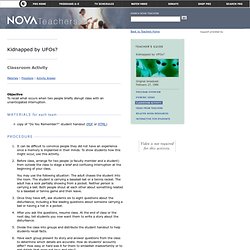
" student handout (PDF or HTML) Crime Case Files, Crime Library, Crime Forum, Crime Blog - Crime Case Files. Apples and Oranges. By Scott A. Sandford, NASA Ames Research Center, Mountain View, California We have all been present at discussions (or arguments) in which one of the combatants attempts to clarify or strengthen a point by comparing the subject at hand with another item or situation more familiar to the audience or opponent. More often than not, this stratagem instantly results in the protest that "you're comparing apples and oranges! " This is generally perceived as being a telling blow to the analogy, since it is generally understood that apples and oranges cannot be compared.